Les publications
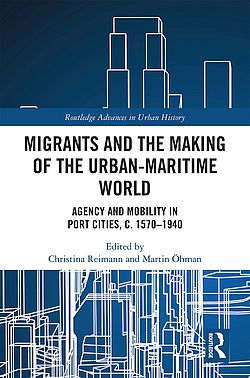
Migrants and the Making of the Urban-Maritime World. Agency and Mobility in Port Cities, c. 1570–1940
03 septembre 2020
Christina Reimann
, Martin Öhmann (Ed.)
Collection: Routledge Advances in Urban History
ISBN: 9781003088950
This volume explores the mutually transformative relations between migrants and port cities. Throughout the ages of sail and steam, port cities served as nodes of long-distance transmissions and exchanges. Commercial goods, people, animals, seeds, bacteria and viruses; technological and scientific knowledge and fashions all arrived in, and moved through, these microcosms of the global. Migrants made vital contributions to the construction of the urban-maritime world in terms of the built environment, the particular sociocultural milieu, and contemporary representations of these spaces. Port cities, in turn, conditioned the lives of these mobile people, be they seafarers, traders, passers-through, or people in search of a new home. By focusing on migrants—their actions and how they were acted upon—the authors seek to capture the contradictions and complexities that characterized port cities: mobility and immobility, acceptance and rejection, nationalism and cosmopolitanism, diversity and homogeneity, segregation and interaction.
The book offers a wide geographical perspective, covering port cities on three continents. Its chapters deal with agency in a widened sense, considering the activities of individuals and collectives as well as the decisive impact of sailing and steamboats, trains, the built environment, goods or microbes in shaping urban-maritime spaces.
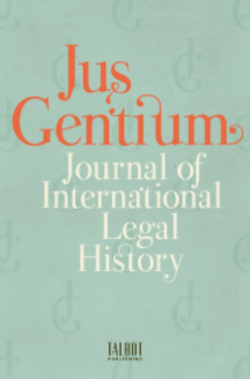
Very Discreet Experts: The “International Association of Penal Law” and the Nuremberg Moment"
22 juillet 2020 ArtikelEdition: Jus Gentium. Journal of International Legal History Vol. 5, No. 2
JUS GENTIUM Journal of International Legal History is the first dedicated journal in the United States addressing the history of international law. Much current scholarship on the history of international law is preoccupied not with international law, but with international legal doctrine; the doctrinal writings of remarkably few individuals dominate the discourse while the rest remain unseen or overlooked. This journal will encourage further exploration in the archives, for new materials and confirmation of the accuracy of past uses, and welcomes the continued reassessment of international legal history in all of its dimensions.
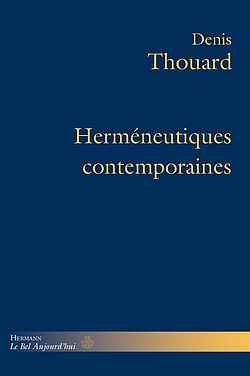
Herméneutiques contemporaines
22 juillet 2020 MonographieLe Bel Aujourd'hui
Edition: HERMANN
Collection: Le Bel Aujourd'hui
L’herméneutique n’est pas le nom d’une philosophie, mais d’un souci de la compréhension. En montrant, à travers plusieurs positions contemporaines, comment ce souci peut être articulé différemment, ce livre entend contribuer à complexifier l’herméneutique. L’herméneutique est essentielle aux sciences humaines, à la constitution de leur objet comme à leur réflexion. Elle s’attache aux traces, aux signes, à la lecture du monde : avec Carlo Ginzburg par la méthode de l’indice ; pour Josef Simon, en déployant une philosophie du signe ; suivant Hans Blumenberg, en lisant le monde. La compréhension du monde est une subjectivité. Elle se constitue dans le sentiment de soi pour Paul Ricoeur. Elle part en quête des « sources du moi » avec Charles Taylor. Elle est saisie dans le rapport à soi ténu de l’humour par Dieter Henrich.
Pour finir, le livre revient, à propos des « Cahiers noirs » de Martin Heidegger, sur l’héritage politique d’une certaine herméneutique et la nécessité d’opérer des distinctions critiques.
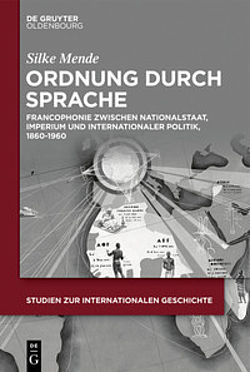
Ordnung durch Sprache. Francophonie zwischen Nationalstaat, Imperium und internationaler Politik, 1860–1960
06 juillet 2020 Edition: De Gruyter OldenbourgCollection: Studien zur Internationalen Geschichte, 47
ISBN: 978-3-11-065236-9
Mit dem Begriff „Francophonie“ wird meist die Sprachpolitik Frankreichs ab den 1960er Jahren assoziiert. Ihre eigentliche Prägekraft als politisches Projekt entfaltete sie jedoch vom letzten Drittel des 19. Jahrhunderts bis zur Dekolonisierung. Sprache und Sprachpolitik waren zum einen ein sensibler Seismograph französischen Selbstverständnisses. Zum anderen wurden sie zu einem politisch-kulturellen Ordnungsinstrument, das auf die Etablierung und Verbreitung von Normen und Vorstellungen sowie die Herstellung gesellschaftlicher Integration und politischer Kohäsion zielte. Von Beginn an war es in gleichem Maße nach innen wie nach außen gerichtet.
Das Buch untersucht die Genese und Weiterentwicklung der Francophonie, nimmt ihre zentralen Akteure, Ideen und Praktiken in den Blick und untersucht ihre konkrete Ausgestaltung. Im Zentrum steht das komplexe Wechselspiel zwischen dem französischem Nationalstaat, seinem Imperium und der internationalen Politik. Damit werden diese häufig getrennt voneinander behandelten Dimensionen französischer Geschichte konsequent aufeinander bezogen. Zugleich wird der anglophone Schwerpunkt der Imperial- und Globalgeschichte um einen zentralen Aspekt des „French Imperial Nation-State“ ergänzt.
Ordnung durch Sprache
Francophonie zwischen Nationalstaat, Imperium und internationaler Politik, 1860–1960
Reihe: Studien zur Internationalen Geschichte, 47
De Gruyter Oldenbourg | 2020
DOI: https://doi.org/10.1515/9783110656305
Silke Mende ist Neuzeithistorikerin mit einem Schwerpunkt in der gegenwartsnahen Zeitgeschichte. Seit dem 1. Oktober 2019 ist sie stellvertretende Direktorin am Centre Marc Bloch.
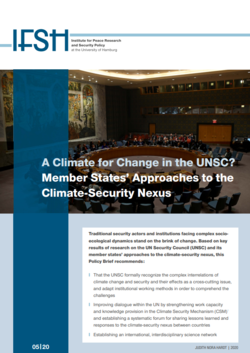
A Climate for Change in the UNSC? Member States’ Approaches to the Climate-Security Nexus. Policy Brief 05|20
22 juin 2020 Edition: Institut für Friedensforschung und Sicherheitspolitik an der Universität HamburgDeutsch
Neuer IFSH Policy Brief: A Climate for Change in the UNSC? Member States’ Approaches to the Climate-Security Nexus
22.06.2020
Inwieweit nehmen die 15 derzeitigen Mitgliedstaaten des UN-Sicherheitsrates den Klimawandel als Bedrohung für ihre eigene und die internationale Sicherheit war? Inwiefern integrieren sie den Klimawandel-Sicherheits-Nexus, also die vielfältigen Sicherheitsbedrohungen, die vom Klimawandel ausgehen, in ihre Innen- und Außenpolitik sowie in ihre Position, die sie in den Vereinten Nationen vertreten? Im neuen IFSH Research Report stellen Dr. Judith Nora Hardt und Alina Viehoff bedeutende Forschungsergebnisse zu diesen Fragen vor. Die Analyse wurde mit Unterstützung eines großen internationalen und interdisziplinären Wissenschaftsnetzwerkes in dem Zeitraum von Dezember 2019 bis April 2020 erarbeitet und legt den Fokus auf traditionelle Sicherheitsakteure, aber auch auf andere staatliche Akteure und schließt ein breites Sicherheitsverständnis ein.
Der vorliegende Forschungsbericht von Dr. Judith Nora Hardt und Alina Viehoff ist der erste, der sich systematisch mit oben genannten Fragen auseinandersetzt. Dabei legt er einen besonderen Schwerpunkt auf die Beziehungen zwischen nationaler und internationaler Sicherheit, indem der Bericht die nationalen Politiken der 15 Mitgliedstaaten des UN-Sicherheitsrat – dem einzigen internationalen Organ mit einem Mandat zur Aufrechterhaltung des Weltfriedens und der internationalen Sicherheit – ins Zentrum der Aufmerksamkeit rückt. Die Studie enthält die detaillierten Forschungsergebnisse, die bereits als Grundlage für den IFSH Policy Brief #5 „A Climate for Change in the UNSC? Member States’ Approaches to the Climate-Security Nexus“ dienten, der kurz zuvor erschienen ist.
Die beiden Autorinnen sehen es als essentiell an, dass der Sicherheitsrat die wechselseitigen Beziehungen von Klimawandel und Sicherheit und die unterschiedlichen Auswirkungen, die sich aus diesen Zusammenhang ergeben, anerkennt. Dabei wird die Notwendigkeit eines institutionellen Wandels des Sicherheitsrates hervorgehoben, der insbesondere durch den Einbezug von wissenschaftlicher Expertise fundiert und multilateral gestützt sein sollte. Zudem empfehlen sie, die traditionelle Sicherheitspolitik, die sich zumeist auf Sicherheit im engeren und traditionellen Sinne bezieht, um sozio-ökologische Aspekte, wie z.B. extreme Wettereignisse und existentielle Bedrohungen für Inselstaaten und zukünftige Generationen, zu erweitern.
Der Research Report entstand im Rahmen des Projektes „The role of climate change in security conceptions and perceptions of the UNSC member states“, das durch das Auswärtige Amt gefördert wurde. Das Projekt war eine Kooperation zwischen dem Institut für Friedensforschung und Sicherheitspolitik an der Universität Hamburg (IFSH) und der Forschungsgruppe Klimawandel und
Englisch
New IFSH Policy Brief: A Climate for Change in the UNSC? Member States’ Approaches to the Climate-Security Nexus
22.06.2020
Dr. Judith Nora Hardt
Traditional security actors and institutions facing complex socio-ecological dynamics stand on the brink of change. How do the 15 current UN Security Council member states approach the connections between climate change and security? In the new IFSH Policy Brief, Dr. Judith Nora Hardt presents the research results of the project "Climate Change and Security in the UN Security Council" [v2] (CLSEC UNSC) on this question. The results illustrate how essential it is for the Security Council to recognize the interrelations of climate and security and their multiple effects. The policy brief emphasizes the urgent need for institutional, multilateral and scientifically-informed change to ensure international peace and security.
The detailed research results will be published in the upcoming IFSH Research Report #5 "A Climate for Change in the UNSC? Member States' Approaches to the Climate-Security Nexus"
[v1]Link zur Homepage: https://ifsh.de/forschung/klimaforschung/klimawandel-und-sicherheit-im-un-sicherheitsrat
[v2]Link zur Homepage: https://ifsh.de/en/research/climate-research/climate-change-and-security-in-the-un-security-council
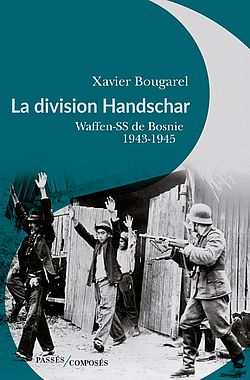
La division Handschar. Waffen-SS de Bosnie, 1943-1945
09 juin 2020 MonographieEdition: PASSÉS / COMPOSÉS
ISBN: 978-2-3793-3365-1
En 1943, les partisans de Tito luttent avec succès contre l’occupant allemand et les fascistes croates, les oustachis. En accord avec le mufti de Jérusalem Amin al-Husseini, Heinrich Himmler décide alors de créer la 13e division de la Waffen-SS, dite Handschar (« Poignard »). Les 20 000 hommes qui la composent sont majoritairement des musulmans de Bosnie-Herzégovine, encadrés par des officiers allemands. Entre mars 1943 et mai 1945, ils s’entraînent en France et en Allemagne avant de combattre les résistants en Bosnie, où ils commettent les pires exactions, en particulier contre la population serbe et contre les rares juifs rescapés des massacres oustachis.
Pour la première fois, un historien spécialiste des Balkans reconstitue l’histoire de cette division en croisant les archives allemandes et yougoslaves. Xavier Bougarel va au-delà des clichés pour s’intéresser aux circonstances de la création de cette division SS atypique, au profil et aux motivations de ses combattants, à la vie religieuse en son sein et aux raisons de sa dislocation finale. Ce faisant, il propose une nouvelle lecture de la Seconde Guerre mondiale dans les Balkans, marquée par l’importance des enjeux matériels immédiats, la multiplicité des stratégies individuelles de survie, ainsi que les changements incessants d’alliances et d’allégeances.
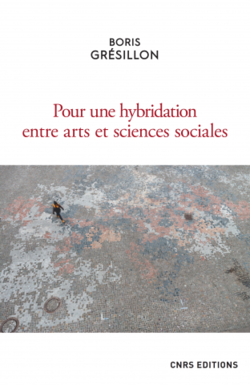
Pour une hybridation entre arts et sciences sociales
29 mai 2020 Essay aus SammelbandArt
Edition: CNRS Éditions
Collection: Art
ISBN: EAN électronique : 9782271135469
Ce livre part d’un double constat : les chercheurs en sciences sociales comme les créateurs peinent de plus en plus à saisir et à déchiffrer le monde contemporain dans sa globalité. Le renouvellement de leurs concepts, de leurs méthodes et de leurs pratiques ne suffit plus à assurer leur pérennité. Face à cette impasse, Boris Grésillon propose une piste originale : et si la rencontre, l’entrelacement voire l’hybridation des sciences sociales et des arts leur permettaient de dépasser leurs limites et d’échafauder ensemble de nouveaux protocoles de travail, d’imaginer d’autres problématiques, d’inventer un langage commun ? Et si le pas de deux des arts et des sciences s’avérait scientifiquement fécond ? L’auteur explore cette hypothèse et la soumet à un examen théorique, pratique et opérationnel. Il en ressort un essai foisonnant, basé sur un corpus renouvelé autant que sur des récits concrets de rencontres fructueuses entre artistes et chercheurs.
L'auteur : Boris Grésillon
Boris Grésillon est géographe de l’art et chercheur en sciences sociales, professeur à l’université Aix-Marseille. Il a déjà publié, sur des thèmes voisins, Berlin, métropole culturelle (Belin, 2002) et Géographie de l’art (Economica, 2014).
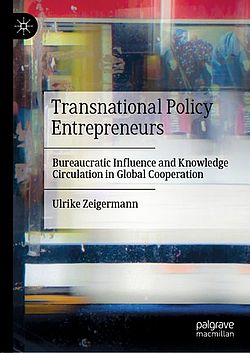
Transnational Policy Entrepreneurs. Bureaucratic Influence and Knowledge Circulation in Global Cooperation
18 mai 2020 Edition: Palgrave Macmillan, ChamISBN: 978-3-030-44892-9
This book explains how transnational policy entrepreneurs have contributed to the transfer of the contested concept of ‘Policy Coherence for Sustainable Development’ (PCSD) in global policy.
Tracing the processes by which the PCSD concept has been diffused in an international epistemic community linked to the EU and the OECD, the book offers new insights on international public administrations’ influence on global decision-making. It highlights the dynamic and multi-directional character of knowledge circulation in policy transfer. Drawing on case studies from France, the United Kingdom and Germany, the book contributes to current debates on sustainable development, revealing the role of actors and the logics behind ‘policy coherence’. Thus, it allows to understand the challenges involved in implementing SDG 17.
Given its scope, the book will be of considerable interest to academic audiences and students of international relations and policy analysis, as well as practitioners and public officials whose work involves global sustainability policy.
Ulrike Zeigermann is a postdoctoral researcher and lecturer at the Department of Political Science and Sustainable Development at the Otto von Guericke University Magdeburg, Germany, and an associated researcher at the Marc Bloch Centre.
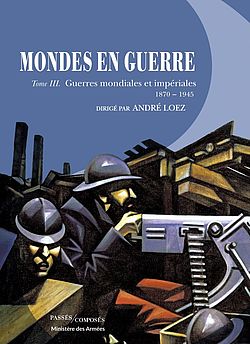
Crimes. Droit de la guerre, transgressions et procès
24 mars 2020
Guillaume Mouralis
, Direction: Hervé DREVILLON & André LOEZ
Edition: Passés / Composés
ISBN: 978-2-3793-3248-7
Guillaume Mouralis, "Crimes. Droit de la guerre, transgressions et procès", in André Loez, dir., Mondes en guerre. Tome III: Guerres mondiales et impériales. 1870-1945, Paris, Berlin & Passés Composés, p. 671-701 (+ illustrations et notes).
Mondes en guerre - Tome III
Guerres mondiales et impériales. 1870-1945
Explorer la diversité des pratiques guerrières sur tous les continents depuis la préhistoire jusqu’à nos jours, telle est l’ambition des Mondes en guerre. Dès l’Antiquité, objet du premier volume, la formation d’empires alimenta un vaste processus de confrontations et d’échanges militaires, avant que l’ère des Grandes Découvertes, au départ du second volume, ne déclenche l’intégration de tous les continents dans un espace martial unifié.
Ce troisième tome explore les guerres mondiales et impériales entre 1870 et 1945, séquence historique où la puissance nouvelle des armes industrielles marque tant d’espaces, de l’Afrique colonisée aux tranchées de la Somme, des steppes de Russie aux immensités du Pacifique. À travers une analyse sur la longue durée d’une période marquée par la sujétion du globe aux grandes puissances militaires, et par une approche thématique – les combattants, les armes, les empires, les mobilisations, les refus ou encore les crimes de guerre –, les auteurs, sous la direction d’André Loez, mêlent histoire au ras du sol, donnant leur place à tous les acteurs ordinaires, et questionnement global sur l’importance des guerres pour les sociétés qui les traversent. Texte, iconographie et cartes inédites permettent ainsi de saisir, dans leur diversité, les expériences humaines de la guerre dans le monde.